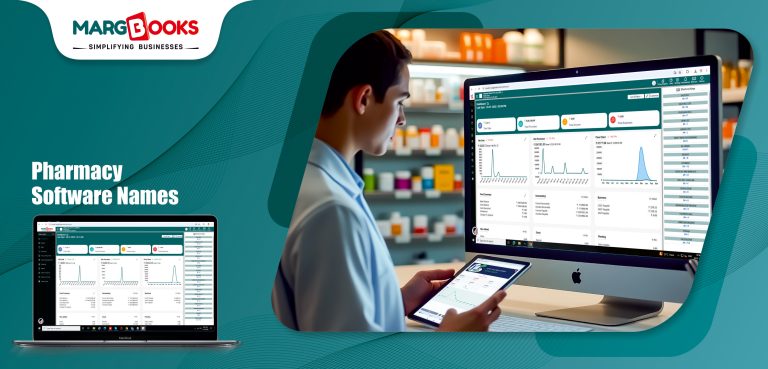Pharmacy software plays a critical role in streamlining operations, improving efficiency, and ensuring the accuracy of dispensing medications. With the healthcare industry’s increasing reliance on digital solutions, having the right pharmacy software is vital for managing prescriptions, inventory, billing, and patient records. Today, there are numerous software solutions available that cater specifically to pharmacies, each designed to meet different needs based on size, type, and scope of the business. In this blog post, we’ll explore some of the top pharmacy software names and discuss their features and benefits.
Why Pharmacy Software is Essential
Pharmacy software provides a broad range of functions that help pharmacists manage daily operations, including:
- Prescription Management: Accurate recording, dispensing, and tracking of prescriptions.
- Inventory Management: Monitoring stock levels, reordering, and managing expiry dates.
- Patient Records: Keeping track of patient history, medication profiles, and consultations.
- Billing and Insurance: Managing claims, payments, and third-party reimbursements.
- Regulatory Compliance: Ensuring adherence to local and international laws and regulations, such as HIPAA in the U.S.
Let’s take a look at some of the top pharmacy software names and their key features.
1. MargBooks
MargBooks is a cloud-based pharmacy and business management software designed for retailers, wholesalers, and distributors, offering real-time access, automation, and compliance with GST regulations.
Key Features:
- Cloud-Based Access – Manage your business anytime, anywhere with real-time data synchronization.
- Automated Billing & GST Compliance – Generate invoices effortlessly with auto GST calculation and filing.
- Inventory & Stock Management – Track stock levels, expiry, and reorder alerts for smooth operations.
- Multi-Device & Multi-User Support – Work collaboratively across multiple devices with role-based access.
Why It’s Popular:
MargBooks is popular due to its user-friendly interface, cloud accessibility, automated billing, and seamless GST filing, making business operations efficient and hassle-free.
2. QS/1 Pharmacy Management System
QS/1 is a widely-used pharmacy software solution designed to cater to both independent pharmacies and larger pharmacy chains. It’s known for its integrated features that help streamline operations from prescription filling to compliance tracking.
Key Features:
- Prescription management with integrated drug interaction warnings.
- Robust inventory management tools.
- Billing, claims, and reimbursement management.
- Real-time reporting and performance analysis.
Why It’s Popular:
QS/1 provides a highly customizable platform that is adaptable to various pharmacy environments, including retail, long-term care, and institutional settings. It also integrates seamlessly with other pharmacy technologies.
3. McKesson Pharmacy Systems
McKesson is a global leader in healthcare technology, and its pharmacy management system is one of the most trusted in the industry. The software offers an array of tools that enhance medication safety, streamline workflows, and provide real-time inventory management.
Key Features:
- Integrated patient information for prescription accuracy.
- Real-time drug interactions and allergies alerts.
- Electronic signature capture for dispensing and billing.
- Advanced reporting features for better business insights.
Why It’s Popular:
McKesson’s pharmacy software is known for its scalability and flexibility, making it a great choice for both small pharmacies and large chains. The platform offers high levels of automation and helps with compliance and safety.
4. Rx30 Pharmacy Software
Rx30 Pharmacy Software is an all-in-one solution tailored for independent pharmacies. It’s designed to help with prescription filling, inventory management, and patient engagement. Rx30 also offers a cloud-based option for pharmacy owners who prefer to avoid managing hardware and software in-house.
Key Features:
- Automated prescription processing.
- Patient care features, including medication synchronization.
- Real-time alerts for inventory and medication issues.
- Cloud-based version available for better accessibility.
Why It’s Popular:
Rx30 offers a comprehensive solution with a focus on enhancing pharmacy workflow. The software is particularly known for its customer service and technical support, ensuring that pharmacies can maintain continuous operation without interruptions.
5. Liberty Software
Liberty Software is a pharmacy management system designed to increase operational efficiency. It’s particularly useful for independent pharmacies and provides various tools for managing prescriptions, billing, inventory, and customer engagement.
Key Features:
- Integrated pharmacy workflow for better task management.
- Real-time drug interaction and safety alerts.
- Comprehensive reporting and analytics tools.
- Mobile applications for on-the-go access to patient data and pharmacy operations.
Why It’s Popular:
Liberty Software is known for its affordability and ease of use, making it an attractive choice for independent pharmacists. Its advanced reporting tools and mobile capabilities help improve both pharmacy efficiency and customer service.
6. Cerner PowerChart Pharmacy
Cerner PowerChart Pharmacy is a part of Cerner’s broader health IT platform, widely used in hospitals and health systems. It provides medication management tools, clinical decision support, and patient safety features to help pharmacists in institutional settings.
Key Features:
- Medication order management and medication administration tracking.
- Integrated with Cerner’s other healthcare IT systems for holistic patient care.
- Barcode medication administration for enhanced safety.
- Real-time decision support alerts.
Why It’s Popular:
Cerner’s comprehensive and scalable platform is designed for large healthcare facilities, particularly hospitals and clinics. It integrates well with other Cerner products and ensures that pharmacists have the tools to provide safe and effective medication management.
7. SoftWriters Pharmacy Software
SoftWriters provides pharmacy management software primarily for long-term care pharmacies. It’s known for its advanced features that help manage complex medication regimens for patients in skilled nursing facilities, assisted living, and other long-term care environments.
Key Features:
- Comprehensive medication management tools for long-term care settings.
- Automated medication dispensing and tracking.
- Electronic prescribing and medication administration records (MAR).
- Regulatory compliance features.
Why It’s Popular:
SoftWriters has built a solid reputation in the long-term care pharmacy space. Its software streamlines workflows and enhances medication safety, ensuring that pharmacy teams can provide the best possible care for elderly or chronic patients.
8. ScriptPro Pharmacy Software
ScriptPro offers both retail and long-term care pharmacy management solutions. It is known for its robotic dispensing technology and integrated medication synchronization features, which help reduce errors and increase efficiency.
Key Features:
- Automated prescription dispensing using robotic technology.
- Medication synchronization and refill management.
- Patient profile management for better medication adherence.
- Real-time inventory control and automated ordering.
Why It’s Popular:
ScriptPro’s automation tools reduce the manual workload of pharmacy staff, allowing them to focus more on patient care. The integration of robotics also increases dispensing accuracy, making it a preferred choice for pharmacies with high prescription volumes.
Conclusion
When selecting pharmacy software, it’s important to consider the specific needs of your pharmacy. Whether you’re an independent pharmacy looking for cost-effective solutions or part of a large healthcare system requiring sophisticated tools, the right software can significantly impact efficiency, safety, and customer satisfaction. Popular pharmacy software like MargBooks offer distinct advantages, so it’s important to evaluate their features, pricing, scalability, and customer support to find the best fit for your pharmacy.
By investing in the right pharmacy software, pharmacies can increase patient care, streamline operations, and stay competitive in an increasingly digital healthcare landscape.




